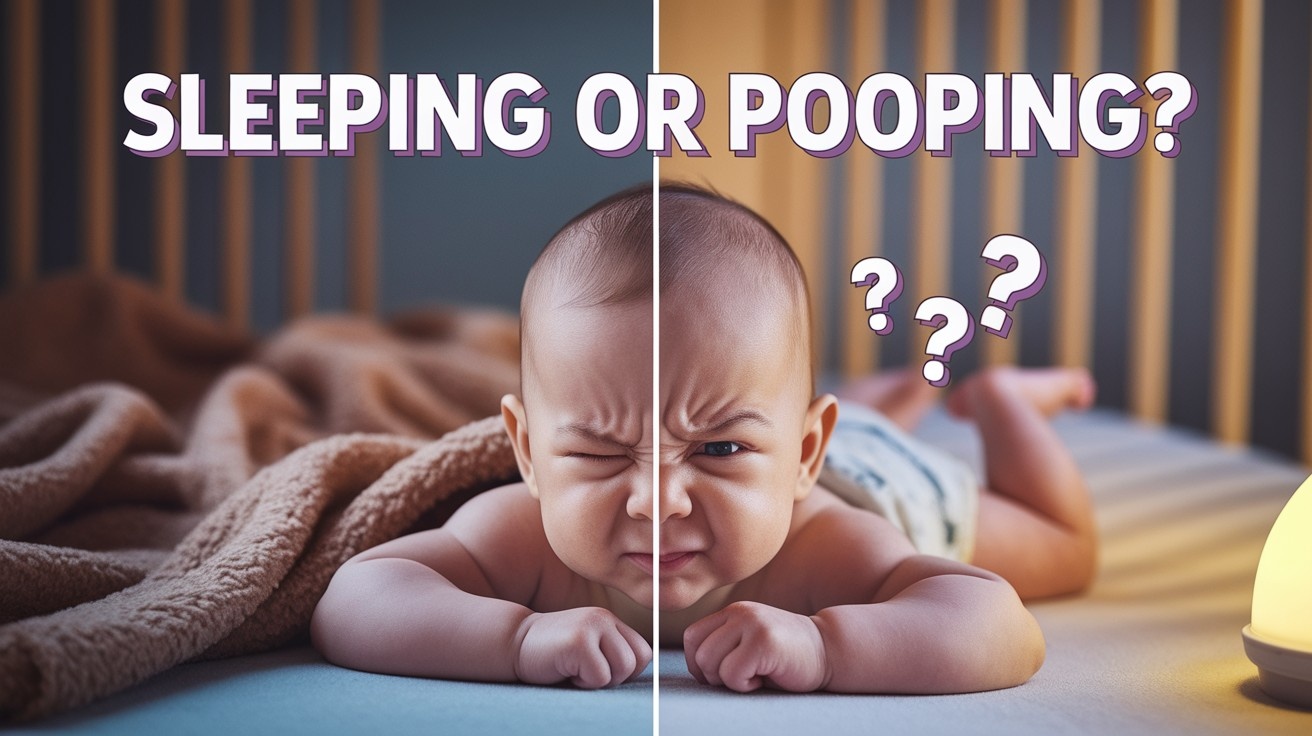
That midnight diaper explosion wasn’t a dream—babies absolutely can and do poop while sleeping!
Sleep-deprived parents often find themselves wondering about every aspect of their newborn’s habits. From counting wet diapers to analyzing strange sleeping positions, new parenthood transforms ordinary people into miniature detectives.
Among the many questions that keep parents up at night is a particularly practical one: “Do babies poop in their sleep?” This seemingly simple question touches on important aspects of infant development, comfort, and health monitoring.
For new parents guiding the maze of midnight feedings and diaper changes, understanding your baby’s natural bodily functions can provide peace of mind and help establish more predictable routines.
The relationship between sleep and bowel movements might seem mysterious, but science offers clear explanations for these natural processes.
Why This Happens: Understanding Baby Bowel Movements
After birth, a baby’s digestive system is still developing. The immature gut processes food more quickly than an adult’s, often resulting in frequent bowel movements, especially in newborns.
Age significantly impacts bowel habits. Newborns may have up to 10 daily bowel movements, while older babies typically have fewer.
This frequency often changes around 6 weeks and again at 3 months as their digestive system matures.
Feeding schedules directly influence pooping patterns. Breastfed babies usually poop more frequently than formula-fed babies due to breast milk’s easy digestibility.
Formula takes longer to process, often resulting in less frequent but more substantial bowel movements.
Nighttime pooping occurs because a baby’s digestive system works continuously. Unlike adults, babies haven’t developed the ability to slow digestion during sleep, causing middle-of-the-night diaper changes that frustrate tired parents.
Do Babies Poop in Their Sleep?

Yes, babies do poop in their sleep, especially newborns and younger infants. This is a completely normal developmental behavior.
Newborns have immature digestive and nervous systems that have yet to develop the ability to wake them when they need to eliminate.
According to pediatric research, approximately 60% of babies under 3 months old regularly poop during sleep.
As babies grow, their bodies develop more control. By 4-6 months, most infants begin developing more regular patterns, with nocturnal bowel movements becoming less frequent.
The transition happens naturally as their digestive system matures and they begin consuming solid foods, which typically slows digestion and creates more formed stools.
Parents should know this is entirely normal and not a cause for concern. Regular diaper changes, even during sleep, are important to prevent diaper rash and maintain proper hygiene.
Age Matters: How Pooping Patterns Change Over Time

Our bowel habits evolve significantly throughout life, from the unpredictable frequency of newborns to the established routines of adulthood and the potential challenges of senior years.
These natural transitions reflect our developing digestive system and changing lifestyles.
Newborns (0-3 months)
Newborns typically have 3-4 daily bowel movements, sometimes more. Their immature digestive systems process breast milk or formula quickly, resulting in frequent, soft stools that can occur anytime—day or night.
These early patterns are highly variable between babies and shouldn’t cause concern unless accompanied by distress.
Infants (4-6 months)
As babies grow, their digestive systems mature and pooping frequency often decreases.
The introduction of solid foods around this age further changes stool consistency and timing. Many infants develop more predictable schedules, though individual variations remain perfectly normal.
Older babies (6+ months)
By six months, most babies consolidate their bowel movements to daytime hours. Their digestive systems now process food more efficiently, allowing for longer intervals between pooping sessions.
This natural development coincides with longer sleep stretches and represents a significant milestone in digestive maturation.
Breastfed vs. Formula-Fed Babies
| Aspect | Breastfed Babies | Formula-Fed Babies |
|---|---|---|
| Stool Frequency | More frequent (5-12 per day in first weeks, decreasing over time) | Less frequent (1-4 per day) |
| Stool Consistency | Looser, seedy, mustard-yellow | Firmer, more formed, tan to brown |
| Stool Odor | Mild, slightly sweet | Stronger, more pungent |
| Digestion Time | Faster (breast milk digests in 1.5-2 hours) | Slower (formula digests in 3-4 hours) |
| Nighttime Pooping | More likely due to faster digestion and more frequent feeding cycles | Less likely due to slower digestion and longer sleep stretches |
| Digestive Comfort | Generally fewer digestive issues | May experience more gas and constipation |
| Gut Microbiome | More beneficial bacteria like Bifidobacteria | Different bacterial profile with less diversity |
| Digestive Enzymes | Contains digestive enzymes that aid in breakdown | Lacks natural enzymes found in breast milk |
How to Know if Your Baby Pooped While Sleeping?
Parents can check for diaper fullness by gently pressing the outside of the diaper without disturbing their sleeping baby. When soiled, the diaper will feel heavier or more substantial.
Pay attention to your baby’s facial expressions. Many babies grimace, turn red, or make subtle movements when pooping, even while asleep. These momentary changes can be telling signs. Strong odors are unmistakable indicators that require attention.
If you detect a smell, it’s likely time for a change to prevent discomfort and diaper rash.
For nighttime monitoring, dim nightlights can help you check without fully waking him your baby.
A quick peek at the diaper’s edge can confirm if changing is necessary without disrupting their sleep cycle.
Pro Tip: Apply a thin layer of diaper cream before bedtime as a preventive measure. This creates a protective barrier that helps prevent diaper rash even if your baby sits in a soiled diaper for a short period while you’re determining if a change is needed.
Should You Wake a Baby to Change a Poopy Diaper?

Generally, yes. While waking a sleeping baby isn’t ideal, leaving them in a soiled diaper can lead to diaper rash, discomfort, and potential skin infections.
For newborns, always change immediately as their sensitive skin is more prone to irritation. By 3-6 months, you may wait briefly if they’re in deep sleep and the stool is contained.
For older babies with solid waste, prompt changing is necessary.
However, if less acidic stools form, you might wait until they naturally wake and until they haven’t leaked. Consider your baby’s skin sensitivity—babies prone to rashes need immediate changes.
Loose or acidic stools require prompt attention to prevent irritation.
The consistency matters, too. Liquid stools spread quickly and cause more irritation than solid ones, demanding a faster response regardless of sleep state.
How to Manage and Prevent Pooping During Sleep?
Managing nighttime bowel movements requires strategic meal timing and proper bedtime routines. Feeding your child 2-3 hours before bedtime allows for digestion and elimination before sleep.
Avoid heavy meals or foods that trigger digestive issues close to bedtime.
Quality diapers with proper fit and absorbency are essential for overnight protection. Thick barrier creams, like zinc oxide, prevent skin irritation and create a protective layer against moisture.
Double-diapering can provide extra protection for heavy wetters.
Establish a consistent bedtime routine, including bathroom time before sleep. Gentle tummy massages in a clockwise direction can stimulate bowel movements. Regular daytime bathroom schedules train the body to eliminate during waking hours.
These approaches help minimize overnight accidents and create more restful sleep for both children and caregivers.
When to Be Concerned About Nighttime Pooping?

Occasional nighttime bowel movements are normal, but persistent patterns accompanied by symptoms like abdominal pain, blood in stool, or weight loss may indicate digestive issues requiring medical attention.
Frequent accidents after successful potty training, changes in stool consistency or color, and symptoms lasting more than a week without improvement are reasons to consult a pediatrician.
Additionally, signs of dehydration or developmental regression in toilet habits combined with behavioral changes might signal psychological stress or medical problems.
Trust your parental instinct—if something seems abnormal about your child’s bowel patterns, professional guidance can provide peace of mind and rule out conditions like irritable bowel syndrome or food intolerances.
Final Words
Yes, babies commonly poop during sleep, especially newborns. This happens because their digestive systems are still developing, and they have not yet established regular bowel control.
Most infants outgrow sleep pooping by 6-12 months as their digestive systems mature and they begin sleeping for longer stretches. Parents should know this is completely normal developmental behavior.
For easier nighttime management, consider using highly absorbent diapers specifically designed for overnight use.
Quick, minimal-stimulation diaper changes using dim lighting can help maintain your baby’s sleepy state. Establishing a consistent pre-bedtime routine may help regulate bowel movements.
Remember that each baby develops at their own pace—some may stop sleep pooping earlier, while others take longer to reach this milestone.
If you’re interested in more informational content on mothers and babies, feel free toclick here and explore other blogs that you might enjoy.
